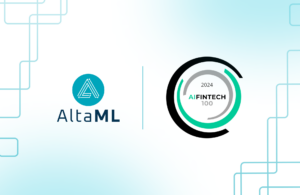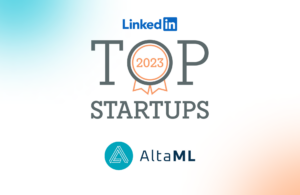Unlocking Innovation: Cultivating an AI-Ready Organization and Driving Adoption
July 13, 2023
•
4 min read
In the rapidly evolving landscape of artificial intelligence (AI), one thing has become abundantly clear: leveraging the power of AI requires more than just the cutting-edge technology itself. It demands a multifaceted team of experts and an organizational culture that is equipped to navigate the complexities of AI projects to ensure they deliver tangible business value.
Recognizing the need for a diverse team is merely the first step. AI initiatives often encounter skepticism and resistance, necessitating measures to garner full team support. Because of this, it becomes necessary for every organization to consider several key factors when building an effective AI-driven team. This includes practical approaches to adoption, education, training, and balanced objectives and ambitions that line up with the overall vision of the AI strategy.
By cultivating a motivated and fully aligned team, you can maximize the potential of AI within your organization.
More Than the ‘Unicorn Data Scientist’
Unlocking the potential of AI often requires more than just technical expertise. This means a wide-range of skill sets and perspectives are required to ensure buy-in from the team to drive organizational success. Discovering the appropriate datasets, establishing sound frameworks, and constructing pipelines are merely the surface-level tasks.
There is a common misconception that hiring a “unicorn data scientist” can effortlessly generate AI solutions without external support. However, expecting data scientists to deliver results without being part of a well-rounded team who understand the business challenges and recognize the potential opportunities is unrealistic.
The individuals who understand the hurdles are perhaps the most important to have as they act as a link between the technical teams and the specific needs and objectives of the organization. They can effectively translate complex technical concepts into practical solutions that address specific business pain points. Having this role fulfilled will steer meaningful outcomes and maximize the value that AI can deliver.
Fostering an AI-Driven Organizational Culture
Attempting to forcefully introduce AI integration into an unprepared organization is not the right approach. Instead, the key to successful implementation comes from thorough preparation and comprehensive training to make sure the organization is well-equipped to tackle the challenges that arise. An AI-forward culture encourages ongoing collaboration, creativity, and continuous learning—empowering employees to embrace new technologies and adapt to a changing business landscape over time.
While few occupations are fully automatable, according to a report by McKinsey, about 60% of all occupations have at least 30% technically automatable activities—estimating that productivity growth could be raised from 0.8% to 1.4% annually.
To position your organization at the forefront of technological advancements and set your team up for long-term success, consider these valuable tips:
Sell the Benefits of AI
Here’s the good news, people are already familiar with automation in their personal lives. We encounter it on a regular basis through social media, e-commerce, and online banking. Interestingly enough, we often interact with AI without even realizing it.
While certain job roles may be impacted due to smart technologies, people will learn to adapt. AI is empowering people to accomplish more quicker, while providing them with the capacity to focus their attention on higher-value work.
Provide AI/ML Training and Education
Many organizations regularly provide training to enhance cybersecurity awareness or teach new technology skill sets. Similarly, companies should establish educational training for AI and machine learning (ML) to foster an AI-driven mindset within their workforce.
It is important to educate employees at all levels about the capabilities and potential of AI, including its impact on the industry, and its relevance to your organization’s goals. This will help create a shared language and frame of mind around AI, enabling employees to contribute ideas and identify opportunities for AI implementation.
An important aspect of education is presenting real-life examples of how automated intelligence is improving your employees’ everyday lives. This includes predicting everything from impending health issues, forecasting the future value of a house, or estimating the potential popularity of a movie. Simultaneously, showcase successful AI and ML implementations in your industry, emphasizing how these companies’ employees have benefited from the achieved success.
Facilitate Upskilling with Resources and Support
After offering AI and ML education, employees may want to enhance their own data science skills. To capitalize on this excitement and encourage deeper engagement, it is essential to provide ample opportunities for team members to develop their technical skills through training programs, workshops or certifications.
By granting access to various AI tools, platforms and research, organizations can empower their employees to experiment and gain hands-on experience with AI concepts within a supportive and safe environment. By investing in employees’ professional development and equipping them with AI skills, you not only encourage participation in AI invitations but encourage them to fully embrace the technology.
Adopt an Upper-Level Approach
To leverage the potential of AI in enhancing human capabilities and driving business outcomes, it is imperative that AI initiatives seamlessly align with the overarching business objectives. This necessitates visionary leaders who possess a comprehensive understanding of workflows and goals across an entire organization. Meaning a top-down approach is of utmost importance.
By nurturing a company culture that embraces AI, organizations can effectively communicate the value to stakeholders and encourage teams at all levels to embrace it and actively contribute to its adoption. This alignment ensures that AI becomes an integral part of the overall business strategy, maximizing its potential for sustainable success in today’s competitive landscape.
Conclusion
To conclude, the key takeaways are that AI requires a multifaceted team due to its complexity and rapid evolution. A diverse team brings together different skills and perspectives necessary for developing accurate, ethical, and goal-aligned AI solutions. Collaboration among data scientists, software engineers, domain experts, and business strategists enables comprehensive problem-solving and continuous improvement. With a multidisciplinary team, organizations can adapt to changes, stay informed, and unlock the full potential of AI for sustainable success.
 Navigating Bias in AI with Open-Source Toolkits
Navigating Bias in AI with Open-Source Toolkits
 AltaML Secures Spot on AIFinTech100 for Consecutive Year
AltaML Secures Spot on AIFinTech100 for Consecutive Year
 Jurisage and CiteRight Finalize Merger, Become Jurisage Group Inc.
Jurisage and CiteRight Finalize Merger, Become Jurisage Group Inc.


